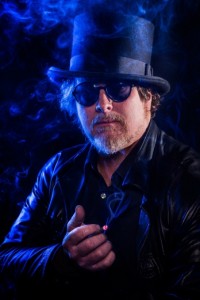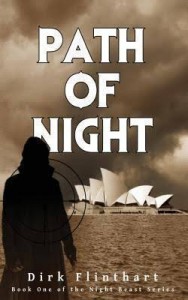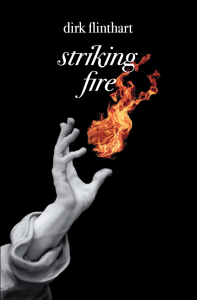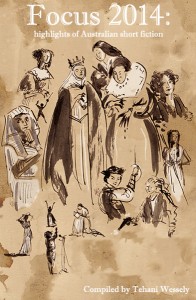 Today’s Focus 2014 victim, errr, author, is the redoubtable Dirk Flinthart.
Today’s Focus 2014 victim, errr, author, is the redoubtable Dirk Flinthart.
What was the inspiration for your story, “Vanilla”?
The inspiration for “Vanilla”? I have to give credit to the editors of Twelfth Planet. They set the parameters. I just… found a space. And quite honestly, I don’t know what ‘inspired’ the piece at all. Like all half-decent stories, of course, a strong part is personal. The goal of the anthology was to write characters and voices which fall outside the usual paradigm. Currently in Australia we have social problems which revolve around incoming refugees, so I felt that was a good place to begin.
“Vanilla” revolves around the interaction between a teenage girl of Somali extraction and a number of alien refugees who have been assigned to her high school. It might have been fun trying to write from the alien perspective… but to me, that felt far too ‘science fiction.’ We’ve had plenty of ‘alien perspective’ stories in the past, but not too many from the point of view of a smart, confused and culturally alienated Somali girl. More to the point, she represented a greater challenge for me. Creating a believable but wholly alien viewpoint is bread-and-butter for a science fiction writer, and it’s relatively easy because who is going to disagree with you? Get your alien physiology and culture more or less consistent, and the character POV follows as a matter of course. A teenage Somali girl in an Australian private school, though — that’s a real-world idea. Portraying someone like that; someone completely foreign to my own experience, but grounded in the world we all know — that felt like a challenge.
In the end, I found common ground with Kylie (the Somali girl.) I think I had to. I don’t know if I’m good enough to create a strongly believable character with whom I have no shared mindspace. (I’ll have to try someday.) The common ground in question: loneliness and isolation, of course.
What should new readers know about you? 
What should new readers know about me? Huh. You know, I have no idea. As a reader, I’ve always cared more about the stories and the ideas than the people that create them. Once a story is out there in the wild, it doesn’t belong to the writer any more. It belongs to the people who read it, recreate it in their heads, and bring it to life. I guess, though, that it might be worth saying: don’t necessarily take this story as representative of what I do. I’m glad it came out well. I enjoyed the challenge, and I’m pretty happy with the evocation of Kylie and her dilemma. But I’m also known for swashbuckling fantasy adventure stories, explodey horror/thrillers, and off-beat comedy. It’s probably to my detriment as a marketable commodity that I shift between genres and tones, and to an extent that does bother me. On the other hand, if somebody wants to offer me real money to produce works in a particular style and genre, I’ll give it a shot. Until then, I will continue to write exactly what I enjoy… and that is a very broad spectrum indeed.
Can you remember the first story you read that made you want to be a writer?
Can I remember the first story I read that made me want to be a writer? You must be joking! I never wanted to be a writer. I just wrote stuff.
My parents tell me I was reading when I was two years old. I can certainly remember reading adult-level retellings of the Labours of Heracles and the Elder Edda when I was five, and I loved those tales even more than I loved the Batman comics I was also reading. There never came a moment when I read a particular story and said: “Why yes! I shall become…. a WRITER!”. They asked me to write stories in primary school, so I did, and it was fun. And I played all kinds of table-top RPGs throughout my teens and twenties, and that was no end of creative fun. I wrote pieces for the university newspaper — including the odd piece of fiction — and that was PAID fun. So, you know: the outcome was inevitable.
Honestly, I have been a storyteller in one form or another for all of my life that I can recall. When you’re stuck with a habit like that, you can either hide it and treat it as a shameful addiction… or you can get it out in the open and try to do something useful with it. I picked the latter, obviously.
 Name your top five favourite authors.
Name your top five favourite authors.
Top five favourite authors, in no particular order: Cordwainer Smith, Ursula K LeGuin, Mikhail Bulgakov, Dylan Thomas, Michael Moorcock.
Understand that at least three of those five names are likely to vary on any given day of the week. And no; you don’t get to ask me why these are favoured. Go read some of their stuff and work it out for yourself. If you catch up with me at a convention or a launch or something, we can sit down and argue about it over a drink.
The future of Australian spec-fic is …?
The future of Australian spec-fic is dark and confused. The paradigm shift in the publishing industry brought about by the rise of digital technologies is changing everything. It’s easier than ever to get published, harder than ever to command an audience. Genre lines blur and run together. (They were never distinct in the first place!). ‘Literature’ with a capital ‘L’ backs itself into a corner becoming increasingly irrelevant to anything outside its own narcissistic, self-referential prose. The day is very close at hand when broad genres are largely dead, as traditional spaces such as crime, romances, science fiction and fantasy acquire more market share, and utilise ever more sophisticated and effective literary techniques. At the same time, micro-genres are already beginning to blossom. Readers are choosing very particular genre-spaces that can’t be summed up by single-word descriptors: western steampunk romance; futuristic crime procedural thriller; non-supernatural splatter horror, and so forth.
The Patreon model and other forms of crowdfunding strike me as a likely future. I suspect that as authors, we’ll write directly to an audience. We’ll build our online spaces to show off our abilities. We’ll publish short pieces and a few longer ones to acquire status and push our way into the audience. And then… we’ll write a set of tantalising pitches for new works, and hang them up in a crowd-funding space, and once the financial rewards are high enough to meet our particular requirements, we’ll write the actual books and release them to our supporters first, then to a broader market.
In other words, it’s not too far off what’s going on right now. Except that the role of big publishers is going to continue to decline, other than in the area of the MegaBlockBuster… which is a pity, really. I don’t tend to like This Week’s Bestseller, and without a decent-sized firm with reasonable cash flow, it’s very difficult for good editors to get paid properly. (And if you don’t think we need good editors, you are desperately ignorant!
Dirk Flinthart writes from north-eastern Tasmania, where he raises his three kids and  tries to look after his long-suffering wife. While he thinks of himself as a writer and indeed, has a history of turning out stories in science fiction, fantasy and horror which pick up the odd award and regularly make the Australian best-of compilations, he also teaches martial arts, maintains a fifty-acre properly (haphazardly!) and is still waiting to hear from the marking panel on the outcome of his Masters degree. His story in the Focus anthology came from Twelfth Planet’s “Kaleidoscope” collection, and received an Aurealis Award. Flinthart has just released a collection of short works through Fablecroft, called “Striking Fire”. He’s currently working on two novels, a screenplay, and a raft of short works.
tries to look after his long-suffering wife. While he thinks of himself as a writer and indeed, has a history of turning out stories in science fiction, fantasy and horror which pick up the odd award and regularly make the Australian best-of compilations, he also teaches martial arts, maintains a fifty-acre properly (haphazardly!) and is still waiting to hear from the marking panel on the outcome of his Masters degree. His story in the Focus anthology came from Twelfth Planet’s “Kaleidoscope” collection, and received an Aurealis Award. Flinthart has just released a collection of short works through Fablecroft, called “Striking Fire”. He’s currently working on two novels, a screenplay, and a raft of short works.

